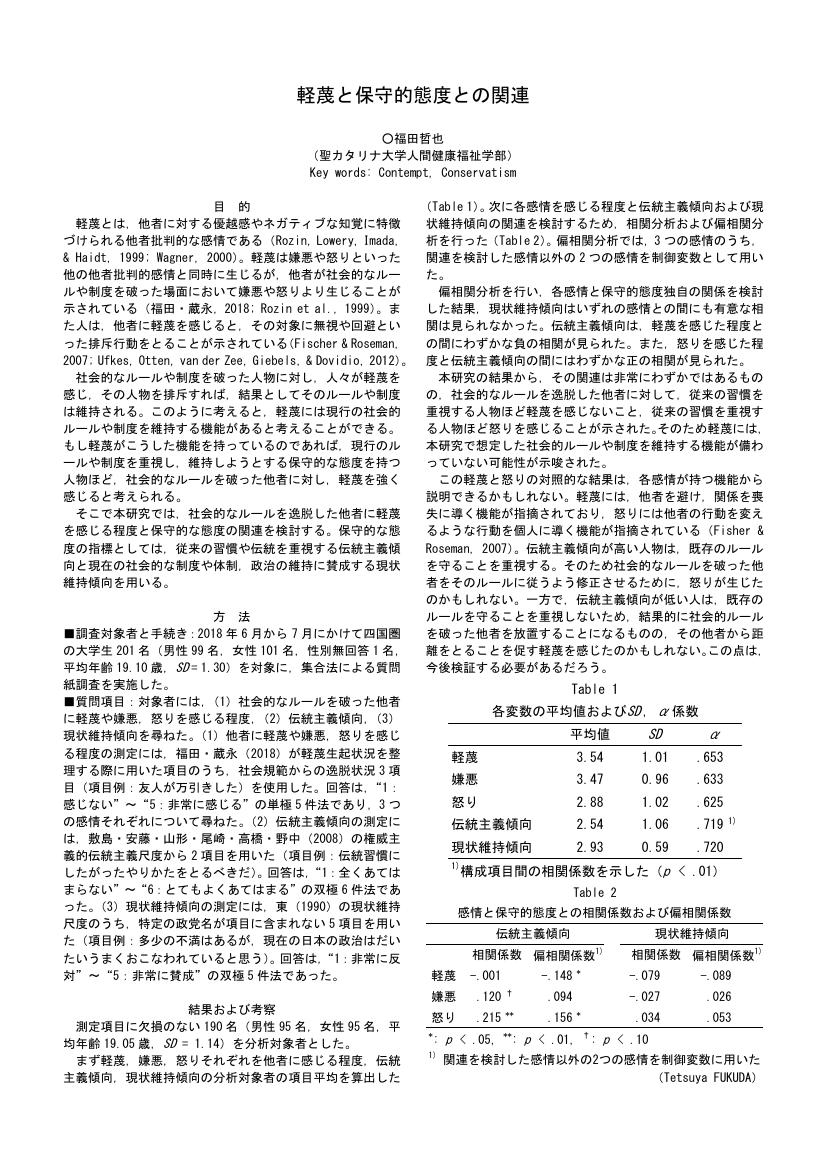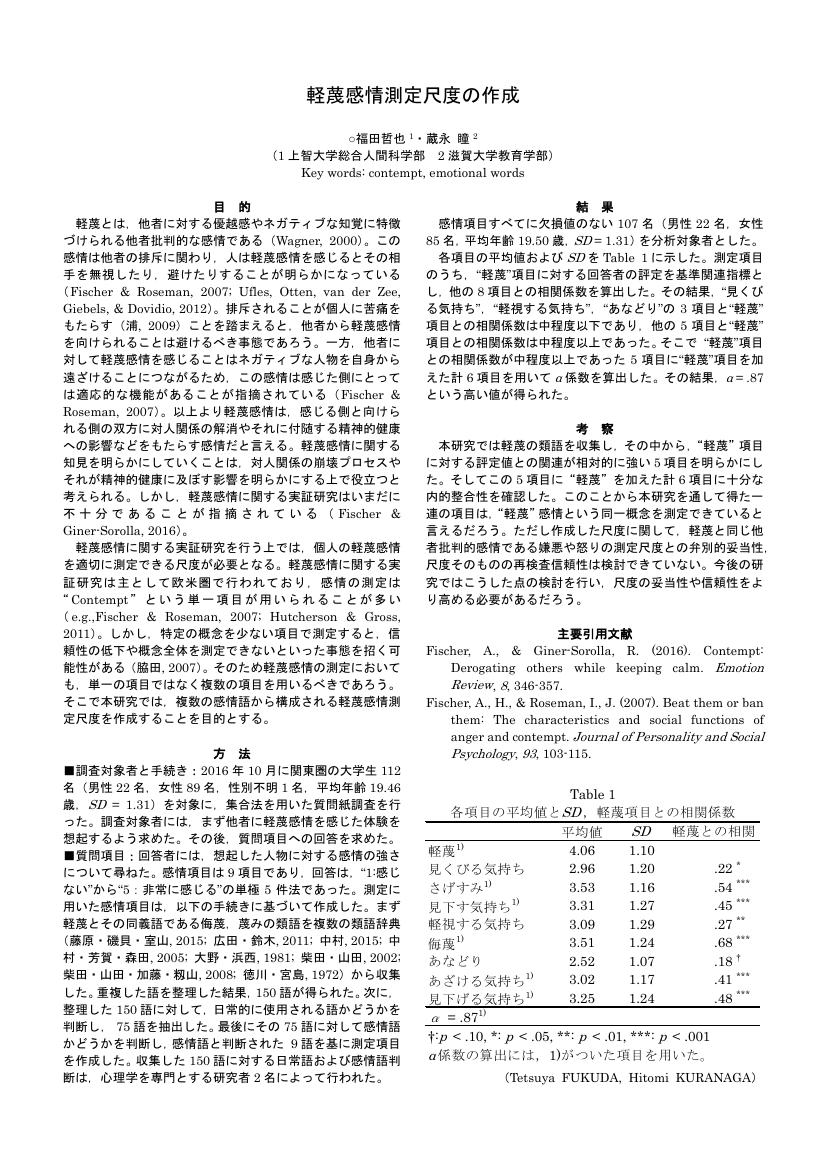16 0 0 0 OA 軽蔑を特徴づける状況─嫌悪・怒りとの比較を考慮した探索的検討─
- 著者
- 福田 哲也 蔵永 瞳
- 出版者
- 日本感情心理学会
- 雑誌
- 感情心理学研究 (ISSN:18828817)
- 巻号頁・発行日
- vol.28, no.3, pp.57-66, 2021-05-30 (Released:2021-06-25)
- 参考文献数
- 15
This study examined the types of situations that evoke contempt. Further, to identify situations that characterize contempt, (a) based on participant responses to each situation, contempt, disgust, and anger were compared; and (b) the intensity of contempt was compared between situations. In the preliminary study, information on situations wherein participants felt contempt was collected and categorized based on content similarity. In the main study, the intensity of feelings of contempt, disgust, and anger regarding situational items developed in the preliminary study were rated. Cluster analysis based on the scores of the three emotions showed that the situational items could be classified into clusters of: “disrespectful behavior,” “shortsighted behavior,” and “lacking common sense.” A repeated two-way analysis of variance (regarding situation clusters and types of emotion) revealed that the intensity of contempt was stronger (a) than that of disgust and anger in cases of “shortsighted behavior” and “lacking common sense” and (b) in cases of “shortsighted behavior” than in cases of “lacking common sense.” Therefore, we conclude that “shortsighted behavior” characterizes contempt.
8 0 0 0 OA 急性期脳梗塞診療における画像診断:適切な再灌流療法を行うために
- 著者
- 古賀 政利 井上 学 園田 和隆 田中 寛大 塩澤 真之 岡田 敬史 池之内 初 福田 哲也 佐藤 徹 猪原 匡史 板橋 亮 工藤 與亮 山上 宏 豊田 一則
- 出版者
- 一般社団法人 日本脳卒中学会
- 雑誌
- 脳卒中 (ISSN:09120726)
- 巻号頁・発行日
- pp.10776, (Released:2020-03-30)
- 参考文献数
- 46
- 被引用文献数
- 3 1
要旨:脳梗塞の診断にはCT もしくはMRI による画像評価が必須である.再開通療法の可能性があれば速やかに最低限必要な画像評価で再灌流療法の適応を決定することが重要である.2018 年に改訂された米国のガイドラインでは,来院から20 分以内に画像診断を行うことが推奨されたが,わが国のガイドラインには画像診断までの時間の推奨はない.わが国では普及率が高いMRI で急性期脳梗塞を評価している施設が多い.機械的血栓回収療法の適応判定には脳実質の評価に引き続き速やかな頭頸部血管評価が必要である.米国では発症6 時間超の脳梗塞に対してCT もしくはMRI を使用した脳虚血コア体積や灌流異常の評価による機械的血栓回収療法の適応を推奨しているが,わが国では灌流画像評価や迅速解析に対応した自動画像解析ソフトウェアが普及していない.急性期脳梗塞に対する適切な再灌流療法を行うための,わが国の医療環境にあわせた画像診断指針が必要であろう.
8 0 0 0 OA 感謝された後に向社会的行動が起こるまでの心理過程
- 著者
- 蔵永 瞳 樋口 匡貴 福田 哲也
- 出版者
- 公益社団法人 日本心理学会
- 雑誌
- 心理学研究 (ISSN:00215236)
- 巻号頁・発行日
- pp.89.16070, (Released:2018-02-20)
- 参考文献数
- 11
- 被引用文献数
- 2
The purpose of this study was to explain the psychological process of exhibiting prosocial behaviors after a person receives gratitude. The results of a preliminary survey indicated that psychological responses are organized into six categories for people who receive gratitude and five categories for those who do not receive it. Participants who participated in this study’s two main surveys completed questionnaires measuring their psychological responses and prosocial behaviors after receiving or not receiving gratitude. Participants in Survey 1 recalled their experiences of receiving or not receiving gratitude from their friends after exhibiting prosocial behaviors, whereas Survey 2 participants recalled their experiences of receiving or not receiving gratitude from strangers. Regression analysis showed that among participants who received gratitude from others, the “affirmative responses to one’s own behavior” promoted a wide variety of prosocial behaviors. Furthermore, a “desire to receive gratitude” promoted prosocial behaviors toward another person after not receiving gratitude.
- 著者
- 福田 哲也 樋口 匡貴
- 出版者
- 日本感情心理学会
- 雑誌
- 感情心理学研究 (ISSN:18828817)
- 巻号頁・発行日
- vol.23, no.3, pp.116-122, 2016-05-30 (Released:2016-12-02)
- 参考文献数
- 22
This study had two purposes: first, we investigated the effects of observer behavior on feeling of embarrassment of an individual, and second, we explained the process of that effect. Participants read a scenario in which they felt embarrassment in front of a friend and the friend responded with one of four types of behavior (helpfulness, avoidance, being humorous, and other-monitoring.) or did not react at all. Participants were then asked to respond to items describing their feeling of embarrassment (Higuchi, 2000) and causal factors of embarrassment (Higuchi, 2001). To examine whether participants' feeling of embarrassment differed, one-way ANOVA and multiple comparison were conducted. These analyses revealed that “avoidance” behavior heightened feeling of embarrassment compared to “helpfulness” or “being humorous” behavior. Moreover, mediation analyses showed three causal factors of embarrassment (apprehension of social evaluation, disruption of social interaction, and loss of self-esteem) could mediate between avoidance behavior and feeling of embarrassment.
5 0 0 0 OA 自然に対してなぜ感動するのか?
3 0 0 0 OA 昆虫全脳シミュレーションへむけて —その構成技術と進展—
- 著者
- 加沢 知毅 宮本 大輔 後藤 晃彦 朴 希原 福田 哲也 神崎 亮平
- 出版者
- 日本神経回路学会
- 雑誌
- 日本神経回路学会誌 (ISSN:1340766X)
- 巻号頁・発行日
- vol.22, no.3, pp.89-102, 2015-09-05 (Released:2015-10-30)
- 参考文献数
- 49
- 被引用文献数
- 2
現在の超並列スパコンの発展は,昆虫脳程度の神経回路ならほぼリアルタイムの詳細シミュレーションが可能な計算力を提供しつつある.ここでは,並列化によって提供される膨大な計算力を昆虫脳シミュレーションに適用するために我々が開発してきた技術的進展とその応用,すなわち NEURON シミュレータの並列・最適化を中心に,それを使用した単一ニューロンのパラメータ推定,ボトムアップで再構成する触角葉神経回路シミュレーションやトップダウンで設計する画像認識の機能をもたせる神経回路構築などを紹介する.
2 0 0 0 医学部1年次の生物教育
- 著者
- 福田 哲也
- 出版者
- 順天堂医学会
- 雑誌
- 順天堂医学 (ISSN:00226769)
- 巻号頁・発行日
- vol.52, no.2, pp.128-132, 2006
2003年以降高校では新しい指導要領にもとづく教育がおこなわれており, 大学としても入学者のうけてきた教育内容を十分に意識した講義, 実習のくみたてを行わなければならない. 指導要領の改訂はほぼ定期的におこなわれているが, 今回のそれはかなり大幅なものであった. 大学設置基準の大綱化がおこなわれてからひさしいが, その波が高校教育にも及んだとも考えられるほど大きな改変であった. また, 本学の入試も一部にセンター入試をとりいれるなど従前よりは複雑になった. そんななかで受け入れた学生の教育を最初に受け持つのは主として一般教育の担当者であるから, 入学者の間の学力のアンバランスを解消するための努力もおこなわなければならない.
2 0 0 0 OA 11 膝蓋骨モビライゼーションが膝伸展筋出力に与える影響
- 著者
- 井ノ上 修一 天満 和人 井崎 義己 福田 哲也
- 出版者
- 公益社団法人日本理学療法士協会
- 雑誌
- 理学療法学 (ISSN:02893770)
- 巻号頁・発行日
- vol.26, no.1, 1999-05-23
1 0 0 0 OA 軽蔑感情の生起状況の検討―有能でない行動による被害者の違いに焦点をあてて―
- 著者
- 福田 哲也 蔵永 瞳
- 出版者
- 公益社団法人 日本心理学会
- 雑誌
- 日本心理学会大会発表論文集 日本心理学会第81回大会 (ISSN:24337609)
- 巻号頁・発行日
- pp.3A-066, 2017-09-20 (Released:2020-03-27)
1 0 0 0 OA 他者への軽蔑が自尊感情の増加に及ぼす影響
- 著者
- 福田 哲也
- 出版者
- 日本感情心理学会
- 雑誌
- 感情心理学研究 (ISSN:18828817)
- 巻号頁・発行日
- vol.28, no.Supplement, pp.ps23, 2020 (Released:2020-12-24)
1 0 0 0 OA ドクツルタケ中毒による昏睡型急性肝不全に対し急性血液浄化療法を併用し救命しえた1症例
- 著者
- 吉田 省造 岡田 英志 土井 智章 中島 靖浩 鈴木 浩大 田中 卓 福田 哲也 北川 雄一郎 安田 立 水野 洋佑 宮﨑 渚 森下 健太郎 牛越 博昭 竹村 元三 白井 邦博 豊田 泉 小倉 真治
- 出版者
- 一般社団法人 日本透析医学会
- 雑誌
- 日本透析医学会雑誌 (ISSN:13403451)
- 巻号頁・発行日
- vol.48, no.2, pp.129-135, 2015 (Released:2015-02-28)
- 参考文献数
- 24
症例は50歳代の男性, キノコ狩りに行きキノコを焼いて食べた翌日に下痢・嘔吐などの消化器症状を自覚し近医を受診. 血液検査にて肝逸脱酵素上昇を認め入院となった. 翌日の採血で肝逸脱酵素の著明な上昇 (AST 5,000台, ALT 5,000台) を認め, 当院に搬送となった. 問診によりドクツルタケ摂取による肝障害を疑った. 入院当日より肝性脳症を認め, 昏睡型急性肝不全と診断. 挿管・人工呼吸管理として, 肝不全治療と同時に毒素除去, 高分子除去を目的として急性血液浄化療法を行った. 入院5日後に肝性脳症は改善し呼吸状態は良好で抜管, 経過良好にて入院9日後に転院となった. ドクツルタケ中毒における血液浄化療法は否定的な意見が多いが, 今回は肝不全を呈したドクツルタケ中毒に対し, 血液浄化療法を行い救命し得た. ドクツルタケの中毒を疑った場合には, 早急な血液浄化療法が有効である可能性が高いと考えられた.
1 0 0 0 OA 感謝された後に向社会的行動が起こるまでの心理過程
- 著者
- 蔵永 瞳 樋口 匡貴 福田 哲也
- 出版者
- 公益社団法人 日本心理学会
- 雑誌
- 心理学研究 (ISSN:00215236)
- 巻号頁・発行日
- vol.89, no.1, pp.40-49, 2018 (Released:2018-04-25)
- 参考文献数
- 11
- 被引用文献数
- 4 2
The purpose of this study was to explain the psychological process of exhibiting prosocial behaviors after a person receives gratitude. The results of a preliminary survey indicated that psychological responses are organized into six categories for people who receive gratitude and five categories for those who do not receive it. Participants who participated in this study’s two main surveys completed questionnaires measuring their psychological responses and prosocial behaviors after receiving or not receiving gratitude. Participants in Survey 1 recalled their experiences of receiving or not receiving gratitude from their friends after exhibiting prosocial behaviors, whereas Survey 2 participants recalled their experiences of receiving or not receiving gratitude from strangers. Regression analysis showed that among participants who received gratitude from others, the “affirmative responses to one’s own behavior” promoted a wide variety of prosocial behaviors. Furthermore, a “desire to receive gratitude” promoted prosocial behaviors toward another person after not receiving gratitude.
- 著者
- 福田 哲也
- 出版者
- 日本感情心理学会
- 雑誌
- 感情心理学研究 (ISSN:18828817)
- 巻号頁・発行日
- vol.24, no.Supplement, pp.ps04, 2017 (Released:2017-04-03)
1 0 0 0 OA 軽蔑と保守的態度との関連
- 著者
- 福田 哲也
- 出版者
- 日本感情心理学会
- 雑誌
- 感情心理学研究 (ISSN:18828817)
- 巻号頁・発行日
- vol.26, no.Supplement, pp.ps36, 2018 (Released:2019-06-08)
- 著者
- 井ノ上 修一 天満 和人 井崎 義巳 福田 哲也 小谷 泉
- 出版者
- 公益社団法人 日本理学療法士協会
- 雑誌
- 理学療法学Supplement
- 巻号頁・発行日
- vol.2001, 2001
1 0 0 0 OA 軽蔑感情測定尺度の作成
1 0 0 0 感謝された後に向社会的行動が起こるまでの心理過程
- 著者
- 蔵永 瞳 樋口 匡貴 福田 哲也
- 出版者
- 公益社団法人 日本心理学会
- 雑誌
- 心理学研究 (ISSN:00215236)
- 巻号頁・発行日
- vol.89, no.1, pp.40-49, 2018
- 被引用文献数
- 2
<p>The purpose of this study was to explain the psychological process of exhibiting prosocial behaviors after a person receives gratitude. The results of a preliminary survey indicated that psychological responses are organized into six categories for people who receive gratitude and five categories for those who do not receive it. Participants who participated in this study's two main surveys completed questionnaires measuring their psychological responses and prosocial behaviors after receiving or not receiving gratitude. Participants in Survey 1 recalled their experiences of receiving or not receiving gratitude from their friends after exhibiting prosocial behaviors, whereas Survey 2 participants recalled their experiences of receiving or not receiving gratitude from strangers. Regression analysis showed that among participants who received gratitude from others, the "affirmative responses to one's own behavior" promoted a wide variety of prosocial behaviors. Furthermore, a "desire to receive gratitude" promoted prosocial behaviors toward another person after not receiving gratitude.</p>
- 著者
- 吉田 省造 岡田 英志 土井 智章 中島 靖浩 鈴木 浩大 田中 卓 福田 哲也 北川 雄一郎 安田 立 水野 洋佑 宮﨑 渚 森下 健太郎 牛越 博昭 竹村 元三 白井 邦博 豊田 泉 小倉 真治
- 出版者
- The Japanese Society for Dialysis Therapy
- 雑誌
- 日本透析医学会雑誌 (ISSN:13403451)
- 巻号頁・発行日
- vol.48, no.2, pp.129-135, 2015
症例は50歳代の男性, キノコ狩りに行きキノコを焼いて食べた翌日に下痢・嘔吐などの消化器症状を自覚し近医を受診. 血液検査にて肝逸脱酵素上昇を認め入院となった. 翌日の採血で肝逸脱酵素の著明な上昇 (AST 5,000台, ALT 5,000台) を認め, 当院に搬送となった. 問診によりドクツルタケ摂取による肝障害を疑った. 入院当日より肝性脳症を認め, 昏睡型急性肝不全と診断. 挿管・人工呼吸管理として, 肝不全治療と同時に毒素除去, 高分子除去を目的として急性血液浄化療法を行った. 入院5日後に肝性脳症は改善し呼吸状態は良好で抜管, 経過良好にて入院9日後に転院となった. ドクツルタケ中毒における血液浄化療法は否定的な意見が多いが, 今回は肝不全を呈したドクツルタケ中毒に対し, 血液浄化療法を行い救命し得た. ドクツルタケの中毒を疑った場合には, 早急な血液浄化療法が有効である可能性が高いと考えられた.
- 著者
- 福田 哲也 堀 賀貴
- 出版者
- 一般社団法人日本建築学会
- 雑誌
- 日本建築学会研究報告. 九州支部. 3, 計画系
- 巻号頁・発行日
- no.49, pp.625-628, 2010-03-01
1 0 0 0 受容体型チロシンキナーゼROR1のB細胞腫瘍における機能解析
慢性リンパ性白血病(CLL)患者に対し、自己の白血病細胞に、生体外でアデノウイルスベクターを用いてCD154遺伝子を導入し、生体内に注入するという遺伝子免疫療法がカリフォルニア大学サンディエゴ校にて施行された。この患者6人の治療後の血清について検討すると、治療前には明らかでなかったアデノウイルスに対する抗体産生が5人に、白血病細胞表面分子に対する抗体産生が、3人に認められた。詳細な検討により、この抗体の中に、受容体型チロシンキナーゼであるROR1に対する抗体が含まれていることが明らかとなった。ROR1に対する抗体を作製して検討したところ、ROR1は健常人の末梢血細胞中にはその発現は認められず、CLL細胞に特異的に発現することが確認された。ROR1には細胞外領域にWntファミリーメンバーと結合しうるCRD領域が存在するが、293細胞を用いて、各種レポーター遺伝子を導入することにより、ROR1と非典型的WntファミリーのWnt5aを共遺伝子導入するとNF-κBの活性化が起こることが明らかとなった。Recombinant蛋白を用いてROR1とWnt5aの結合はin vitroにおいて確認された。このWnt5aとROR1の結合はCLL細胞のin vitroにおける生存率を増加させる事が明らかとなった。この生存率増加は治療後の患者血清を添加すると抑えられ、患者体内でROR1のブロッキング抗体が産生されたことにより、治療効果が得られたと考えられた。






